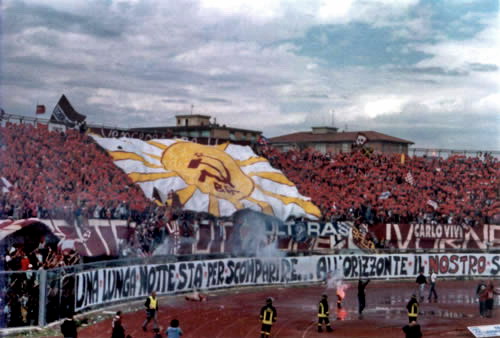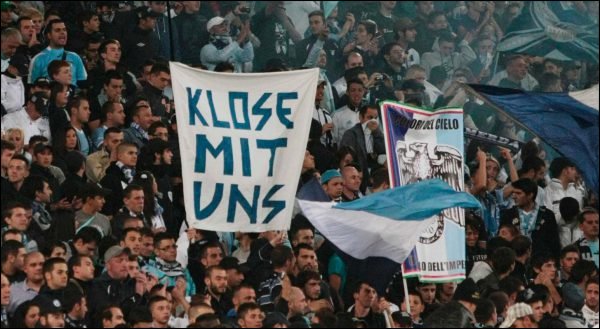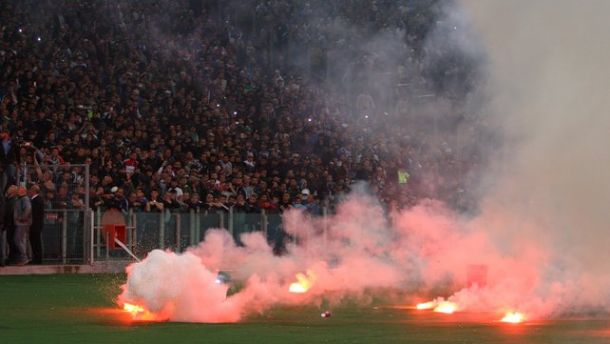Following the events which marred Sunday's Coppa Italia, there is one question on the lips of Calcio enthusiasts the world over; are Ultras a thorn in the side of the Italian game?
Napoli Ultras delayed the game over half an hour on Sunday when they continually threw flares and other pyrotechnics at stewards. Their motives being that the match should have been called off after three Napoli supporters were shot in Rome. Marek Hamsik approached the Curva to negotiate an agreement and the match eventually went ahead as planned. It should have been a day of rejoicing for Napoli fans as their club beat Fiorentina 3-1 but the party was overshadowed by the events which preceded the match.
This is not the only instance of Italian Ultras trying to postpone a match; in a third division tie in November between local Campania rivals Salernitana and Nocerina local authorities banned away fans in the interests of safety. What ensued though, was one of the most bizarre moments in the history of Italian football.
Allegedly, the Nocerina fans stopped their team's bus outside the stadium and told the players not to play, threatening those who refused with death. When the match started the Nocerina players looked frail as they went down like flies.
They were forced into making all three subs in the opening three minutes, and by the twentieth minute the referee was forced into abandoning the match as a further five players were forced off through “injury”. Salernitana were awarded a 3-0 victory by default.
Ultras groups in Italy started in the 1960's as a platform for fans to make their voice heard. These colourful, passionate supporters politicised the game, usually only on a regional scale. For example in the largely Conservative region of Veneto, Hellas Verona's Ultras hold right wing ideologies. Livorno, the city where the Italian Communist Party were founded, are known for their far-left views.

During the 1980's Italian fans began to adopt the notorious Casual approach fans in England were infamous for. Police presence inside stadia was increased and this only infuriated Ultras groups, now with a sentiment which was not only anti-establishment but now also anti-police. As the years went on, so did the country's struggle with troublesome supporters.
Sunday's events made it clear that Italian football still has a long way to come in terms of hooliganism. In fact the gun violence perhaps shows that the country has gone backwards rather than forwards.
Unlike in Germany, fans have no ownership of their clubs, however many owners in Italy happily encourage singing sections to give the stadium a certain vibrancy and so reward them with privileges such as costless tickets.
Bombs were once sent to Lazio owner Claudio Lotito when he tried to abolish the costless ticket scheme. Indeed, the 56 year old owner of Roman club Lazio is not an admired figure by the club's supporters. In March, they played a match against Atalanta in a near empty Stadio Olimpico as fans boycotted it in protest against Lotito's running of the club.
It is no wonder then, why Ultras in Italy are considered the voice of the supporters and why they are frowned upon by those in the executive boxes. They can, however, be controversial in their politics.
Italy struggles greatly with racism in football, rather ironic considering its devout catholic traditions. Lazio fans once produced a banner with the slogan “Klose Mit Uns”. A controversial play of words on the Nazis' slogan “Gott Mit Uns”. This was scarily close to the bone considering the amount of Italians massacred by the Nazis and by their own fascist leader Benito Mussolini.

In 2010 Juventus were fined 25,000 Euros when their supporters racially abused then Inter Milan striker Mario Balotelli. On Sunday, Inter Milan were fined 50,000 Euros for their fans' abuse of the same player, now playing for their rivals AC.
Ultras aren't necessarily burdensome, however in Italy they can be a bit of a handful. But many outsiders are quick to judge; the problem in Italian football mainly lies with its casuals and not with its Ultras – they are usually two separate entities. Except of course from certain instances such as Sunday's cup final. Perhaps fans in Italy should follow a more German model were violence in football is a rarity and politics are kept to a minimum.
That is not to say politics should be discouraged in football. As long as those politics don't preach hatred and discrimination, why shouldn't they be permitted? It helps to give a club an identity and fans a voice. After all many clubs in Italy represent towns, cities and regions full of different cultures and histories and that should be a cause for celebration for Ultras.










































